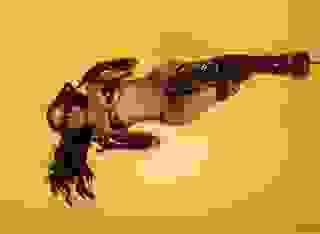- BDSM
- The New Republic
Note: You can change font size, font face, and turn on dark mode by clicking the "A" icon tab in the Story Info Box.
You can temporarily switch back to a Classic Literotica® experience during our ongoing public Beta testing. Please consider leaving feedback on issues you experience or suggest improvements.
Click hereI would like to thank the volunteer editor Kenjisato, for his time and skill in editing this story
--------------------
The New Republic
Justice was quick in the Republic of Siegel. Matthew Crowley reflected on this, as he watched a line of prisoners being marched towards the courthouse.
As they trudged up the steps, a massive statue of Marcus Siegel, the founder of the Republic, looked down at them, a grim expression etched into his stone face. The prisoners were immigrants, Marcus suspected, and recent ones at that. Citizens of the Republic or even long-term residents would have known better than to participate in yesterday's protest turned riot.
He looked at the line of prisoners; they were all women, of course. Probably refugees from the disaster caused by the latest attempt to establish a national government in London. It had been tried repeatedly over the last eight years, every time collapsing into a mass of competing factions fighting over limited resources, with disorder, chaos, and occasional famine resulting.
It had been eight years since the last true British Government had finally collapsed. It had tried and failed to lead the country through the series of calamities that followed Scarlet Death, a worldwide pandemic that had killed an estimated sixty percent of the world's population.
The Scarlet Death was still not fully understood; he had heard it described as being similar to hemophilia. It had appeared and burned itself out in a vicious eighteen-month cycle. Unlike other diseases, however, it had not killed entirely without distinction. While most young, healthy females were immune, every male got it, and nearly four in five died, particularly older men.
Matthew, himself, had suffered through two weeks of agony, as his body hemorrhaged and bled. He had caught it early on, a young soldier who had only been in his regiment for just a few weeks. He had emerged on the other side to discover that everyone else in his regiment had likewise gotten it. They had been sealed off in their barracks to die, lacking even basic care, resulting in an even higher death rate.
Recovered but still weak, he had emerged with a handful of others from the graveyard that was his barracks, to be put to work by a government that was already much changed.
He had been angry at his treatment, and the deaths of his comrades. Angrier still, when the government that had abandoned them, then seemed determined to exploit them, using them to enact policies that seemed both divisive, and to make little sense. The anger built up inside him, and the small number of surviving male soldiers, but through the rage, the one thing he and his comrades began to focus on, was that the clique of people giving them orders--were all women. Then Marcus Siegel had appeared, and he had changed everything.
He looked up at Marcus's statue and sighed--those were hard years, and Marcus had been a hard man.
More vans pulled up and started to unload additional women. Looking at the scene, he wondered if this was the shape of things to come.
There were currently eighteen women for every man in the Republic; immigration was strictly regulated by the Republic, at least for men. However, the same laws that denied women full civil rights within Republic territory, also meant that the immigration restrictions didn't apply to them. Any woman could enter Republic territory one time, and she could leave at any time; however, she could not return without special dispensation.
Matthew looked at the line of women, as they traipsed dejectedly through the door of the courthouse. Even now, these women could leave, they could turn to a guard, and ask to be shown to the border. However, he knew that any of those women that had been outside the Republic's borders in the last few years, was unlikely to exercise that right.
It was made worse by factories and employers who wanted cheap labor. The whole system was open to exploitation and the Senate, used to passing legislation to control women, had only grudgingly started to enact laws to protect them. Matthew knew, however, that the fundamental problem would not be solved; there was no chance that the Senate, or the citizenry, would ever allow male immigration that might dilute the small pool of voting citizens. A return to full civil rights for women wasn't even considered.
As he watched the female Auxiliaries drag prisoners from the van, he thought back to the arguments over the creation of such a force. The recruitment of a female security force had been resisted for years, but it was inevitable. There simply weren't the men to do it. Even the men that they did send him, were the dregs of their units. Marcus commanded the security forces for an entire district; yet, he was becoming more and more reliant on women to exert the state's authority.
There had been plenty of applicants for the new force, that quickly gained a reputation for viciousness. Matthew had thought that a force consisting of women would be sympathetic to other women. That they had inadvertently created a force that was far more abusive to the female population of Siegal, than the regular police ever had been, was still a source of consternation for many people.
"Excuse me, sir!" a female voice said, behind him. He turned around to see a grey-clad female Security Auxiliary.
She curtsied neatly, as Auxiliaries did in lieu of a salute. "Ms Baker asks if she should start to bring the rest of the prisoners in."
He looked at her sternly; he looked at her nameplate--Auxiliary third class Smith. "AC3 Smith, why are you out of uniform."
She hesitated and looked down; she was wearing trousers. "Ahem. Ms Baker said that we should..."
"Ms Baker ordered you to violate Ministry regulations and wear men's trousers?" he questioned, his anger growing but not for the reason Smith thought. "When did she order you to do that?"
Smith looked at him, she didn't look stupid and seemed to appreciate she needed to choose her words carefully. "Yesterday, before--"
"Before the protests." he said, cutting her off. That vicious bitch had given the order before sending out her women to police what was initially a lawful protest. She had expected trouble, or rather intended to start it.
"Tell Senior Auxiliary Baker that she and her section commanders are to make their way immediately to the courthouse guard room, and to wait for me there." With a wave of the hand, he dismissed her. Smith curtsied quickly and double-timed it to find Baker.
The organisers of the protest had gone through every hurdle to secure permission, prior to the march. Even though none of them were citizens, they still had some rights and one of which was the right to assemble and make their grievances known to the authorities, provided it was lawful and 'respectful'. There were many in the Senate that remembered the days of the old government, when protests were declared violent. The police and army being ordered to use live ammunition to disperse them. The Republic was a strict, and sometimes brutal, society, but it was one that had laws.
He had made it clear to Baker, that her job was to ensure that the protest was peaceful; instead, she had behaved with her characteristic viciousness and provoked a riot. He kicked himself for not being there himself. He turned around and shouted for a passing Auxiliarie to find Captain Howard, the officer that was supposedly in operational command.
As he walked to the courthouse, he came across a line of prisoners, some looked the worse for wear, but all were well dressed, in compliance with the Republic's strict dress codes. All wore dresses that came to below their knees, their shoulders were covered; these were hardly radical feminist agitators coming to undermine the Republic from within.
Some of the group of prisoners looked to be limping. He ordered them to stop. As the group of eight women turned to face him, some immediately curtsied. The other women took a moment and then followed their example, performing the act with various degrees of success.
He looked at the group, "Turn around, and lift your skirts above your hips," he ordered.
Again, several of the women immediately complied, others hesitated, and had to be prompted by their friends. One woman started to cry. An Auxiliary stepped up to the woman, baton in hand. Matthew waved her away.
As the other women raised their skirts, he saw two weren't wearing knickers, and had savage red welts up and down their thighs and arse. Matthew felt a stab of anger. He ordered them to lower them. He turned to the crying woman, who hadn't been able to lift her skirt, he knew she would have similar welts.
"I'm sorry..." she said, sobbing, "they ripped my..."
Matthew realised that the Auxiliaries had ripped the women's knickers off prior to caning them. "Where did they do it?" he asked her.
"In the square," a woman said, one of the two that had been able to show her welts. Matthew turned to face her. She was blonde, in her mid-thirties, and well spoken.
"And you are?" Matthew asked.
"Sophie Cole," she replied. "After they arrested us, they began by picking women at random to cane." She carried on with a precise tone in her voice, "I protested that they couldn't cane us without an officer present, and without a master-at-arms to administer it; their response was to give me a dozen strokes."
Matthew nodded his head. "That's true," he said. "You're familiar with the Republic's laws?" he asked.
"I had a spare morning to read them," she said tersely. "We had a permit from the Ministry of the Interior for the protest," she said. "We obeyed every instruction, and they just started beating us unprovoked."
"What did you and your friends do, after they started beating you?" Matthew asked.
She hesitated for a moment. Matthew could tell that she understood that what she said could get all of them in even more trouble.
"All of us took whatever action we could, to try and protect ourselves," she said, carefully.
"You mean you assaulted the security force," Matthew said. "You assaulted uniformed members of the Security Services."
"There was no intent to cause any harm or obstruction," she said. "Instinctively flinching when someone is beating you with a baton, is not assault."
Matthew looked at her. "There are three Auxiliaries in hospital with concussions or broken bones," he said, "that's not the result of someone flinching."
"It was dark. They were lashing out in all directions with their batons."
"So, you're saying they hit each other," Matthew said, trying not to smile. "Is that what you're going to say in front of the court?" he asked
"I haven't argued in a court in nearly 8 years," she said, in what Matthew thought was a slightly sad tone. "I don't know what I'll say. Will I be given the opportunity to speak?"
Matthew nodded. "If you wish. However, if you plead not guilty, and are then convicted, the sentence will be harsher." He wanted to talk with his woman further, but he felt it was inappropriate. "Thank you for your time, Ms," he said, and turned to walk away.
"They're not members of the Security Services!" her voice shouted behind him.
He turned back to her. "Excuse me?" he said. He could see she was breathing hard, almost exhilarated.
"You said we assaulted uniformed members of the Security Services. That's not true!"
Matthew could see they were starting to attract a crowd; Captain Howard had appeared, as well as the Court deputies looking to take what was then the last batch of prisoners into custody. He could not resist, though. "How so?" he asked.
"Auxiliaries are women," she said, obviously trying to remain calm. "They hold no warrant or commission. Yes, they swore an oath, but that oath was never entered into the Senate record. They can't be members of the Security Services."
Matthew thought for a moment. "So you can assault a female employee of the Interior Ministry, with impunity?" he asked, in response. "That's your argument?"
"No. If I assault a female clerk that works for the ministry, I'm assaulting a servant of the ministry, but Auxiliaries are not employees of the ministry, they're a separate body raised by a line item in the budget. The Senate has given them no statutory basis for existing." She paused, searching for an example in her head. "They're funded in the same way that someone who's mentally deficient, gets a stipend from the state."
Matthew saw the Auxiliaries around her start to bristle. He tried to suppress a smile. "It's illegal to assault mentally deficient people, as well."
"Not if they're trying to attack me and disrupt a lawful gathering," she said, simply. "We had a legal basis for being on that street; the Auxiliaries did not."
"I signed a written order for them to be on that street," Matthew said.
Captain Joe Howard, who had been watching the exchange, spoke up. "What about the non-citizen troops we employ?" he asked. "There are whole regiments in the Army that are non-citizens, their officers don't hold commissions."
"They're men," she said, simply "and they're not allowed within the Republics borders."
Howard shrugged in response. "Look," he said, "you're going in front of Judge Hopkins. It's going to be twenty-one days and eighteen strokes all around." He looked at her, "But, he can do worse; he can put a blue notice on you. Do you know what that is?"
"Yes," she said. And it was clear she did.
Republic law was full of eccentric touches. The same laws that denied women various civil rights, such as jury trials, also meant that there were limits to what punishments a court could administer to a woman, such as, maximum confinement of fifty-six days in a 180-day period. There were twenty-seven capital offenses in the Republic Criminal Code, and none of them could be applied to a woman.
This had quickly become a problem, after the first female murderer made her appearance and was dutifully released.
Then there were the various insurgencies and terrorist campaigns often waged by female fighters. The Senate had found various ways of countering these threats, without violating the letter of the law, but still some legal changes were needed.
Marcus Siegal had been unwilling to change the fundamentals of Republic law, so they had doubled down on the female-control acts, adding two additional laws. One was the legalisation of reasonable 'chastisement', usually taking the form of caning. The second was an amendment to the criminal record law. Under Republic law, a crime was expunged once the sentence was served. This had become a sacred tenet because many men in the Republic had been victims of a blacklisting under the old government, which it had applied against their enemies; keeping them unemployed, lacking bank accounts, and the ability to function in society.
The Republic could not deport a woman, but they also did not have to sentence her for a crime. Instead, they could issue a 'blue notice', leaving her in a perpetual state of legal limbo--she was a criminal, and would remain one because she could never complete her sentence. She would be denied employment, bank accounts, housing, and rendered destitute.
The Chastisement Act had passed without much fuss, but the 'blue notice' caused an uproar, and it was only passed by creating a further legal fiction--that it was cancelled, by a suspect making a plea directly to the Senate, which a woman could never do.
It was rarely employed, and despite what Jones said, he doubted that it would be employed. Most likely, the judge would give her the full fifty-six days, and as many strokes as a doctor would allow.
Matthew looked at his watch. "Court begins in a little under two hours." He looked at his watch again. "Go with the deputies," he said, "if you want to argue this, I'll see you go in front of the Judge first." He saw the fear in her eyes. "Hopkins used to be a barrister." he said, "After he kept defending people during the purge, he got added to the lists himself."
She looked at him. She looked sad again. "What happened was wrong," she said.
"Yes, it was," he said. "Though, I imagine it was a difficult time for a young lawyer starting out."
She looked genuinely ashamed, and Matthew wondered what her role was during the purge. "Well," he said, "we didn't get our day in court, but let's see if we can get you yours."
He saw the woman who hadn't been able to raise her skirt still looking terrified, but obviously wanting to say something. He guessed what it was. He turned to the senior Deputy, a lean grizzled man in his forties.
"Deputy," he said, "could you please give my compliments to the court Sheriff, and inform him that all of the prisoners were properly dressed when we took them into our custody. If some are lacking underwear, there's no need for any punishment."
He saw a look of gratitude pass over the poor woman's face, and he felt a twinge of sorrow about this whole mess.
The Deputy gave the Auxiliaries a look and replied that he would.
"And ask him if he could send a master-at-arms to join me in the guard room, with his cane, if he pleases." The Deputy looked interested "I'm a master-at-arms, sir, I'll be there presently."
He thanked the Deputy and let him take the prisoners away. He dismissed the Auxiliaries present, who seemed to be milling around aimlessly, most likely because their leadership was waiting in the guard room.
He let the prisoners get a suitable distance, before he rounded on Howard. "I am sick of your fuck-ups, Joe," he said, more exasperated; he wasn't even able to get angry anymore. "You know how close we are to a full-scale war in the border territories, and this is what we're spending our time on?"
"You're right, sir," he said. "It's my fault. I should have been there, and I'll send a report to the Senate stating that."
Matthew waved his hand. "No. Look, I know you don't want to do this job, but you are the Commander of the Auxiliaries--you need to keep them in line. Instead, you leave them to their own devices and this is what happens."
"I'll get a grip of them, starting today," he said.
"You see what they did to those women?" Matthew said.
"I'll deal with it!" Joe said.
Matthew looked at his watch. "Well, let's make a start on that now, shall we."
Captain Joe Howard said nothing. He had known Matthew from their time in the old British Army. They had both joined the Mutiny that Marcus Siegal had started, after the old government had attempted to use nuclear weapons. They had fought on through the foundation of the Republic; later, they had served in the brutal wars in Oxford and the west country, even in France during the intervention. He knew what that look meant.
They found Senior Auxiliary Baker and the three section commanders, in the guard room. They all immediately jumped to their feet and curtsied.
Baker was not a stupid woman, just a cruel one. She was a former university administrator, and she had been living in the Republic since its foundation. One of those women who managed to comfortably navigate the female laws, that restrained so many other women.
She started to speak, but Matthew raised his hand, "Be quiet," he said. "None of you are to say a word, unless I specifically ask you to. That's an order; acknowledge that you understand."
He got a jagged reply of, "Yes, sir," from all four women. He looked at them. All were educated university graduates; they should have been ideal candidates for their jobs. "It's very important that you listen to what I'm about to say. 147 women are about to go in front of the judge for various offenses. To the court, it matters what they did, not why."
One of the section commanders, a petite redhead, Alice Brown, looked down at the ground unable to meet his eyes.
"However it matters to me, and it's going to matter to you as well very shortly. Prior to the protest yesterday, I made clear my intent." He pointed at Brown. "State it again."








